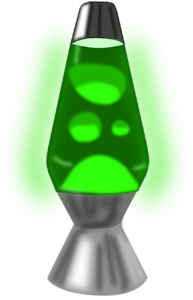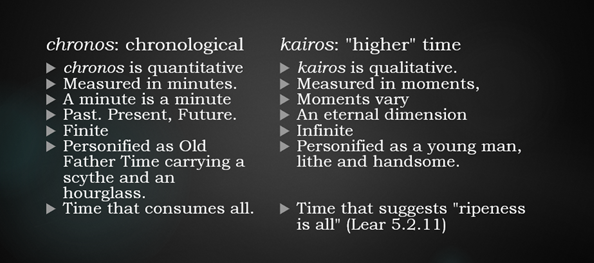
Bru-nO / Pixabay
In English we have only one word for time. The ancient Greeks had two because they understood time in two ways. First, there is chronos, or ordinary time, in which one thing happens after another. The other is kairos. We’ve mostly lost a sense of this kind of time, to our detriment.
chronos versus kairos
Chronological versus Kairotic Time
Chronological time refers to clock time–time that can be measured in fixed units–seconds, minutes, hours and years. Kairos measures moments of flexible duration. Chronological time is divided up into past, present, and future, but kairos is the present and has an eternal element. Chronological time is personified as Old Father Time carrying a scythe and an hourglass–it is a time that consumes all. Kairos time is personified as a young man, lithe and handsome–it is a time that suggests “ripeness is all” (Lear 5.2.11).
Chronological time, named after the titan who ate his children, destroys and consumes. All material things experience the ravages of time. In the Hobbit, Gollum’s riddle in the dark is about chronos time:
This thing all things devours:
Birds, beasts, trees, flowers;
Gnaws iron, bites steel;
Grinds hard stones to meal;
Slays king, ruins town,
And beats high mountain down.
There is a monstrous quality to chronological time. Chronos time is made up of past that doesn’t exist anymore and future that doesn’t yet exist. Because its made of these intangibilities, chronos time takes on a spectral quality. To make matters worse, as Gollum says, it kills and consumes. It is a terrifying creature. Dead, but devouring and it never stops coming. There’s something hellish about the eternal monotony of mechanical time.
Where chronos suggests death, kairos suggests life. The present is the only part of time that actually exists; it’s alive, and if you are experiencing it, you are alive too. The term Kairos contains the idea that not all time is the same. Sure there is the regular and mechanical passing of minutes, but there are also immeasurable moments that catch us by surprise, that bubble up from within time or flow into it from somewhere, or somewhen, else. These interruptions of ordinary time by higher time suggest a link with the eternal–the “everlasting now” which is the time of heaven.
Hourglass or Lava Lamp

Clker-Free-Vector-Images / Pixabay
I want to suggest that when you think of time, don’t only imagine the hourglass of chronos, but a lava lamp of kairos time–irregular and surprising.
Our worldview both shapes and is shaped by our language. Because we have only one word for time, we are in danger of thinking and living under the idea that time is simply chronological.
I’ve had students tell me that eternity sounds boring? It certainly does if you think of it in terms of chronological–dead–time. If we broaden our understanding of time, we will not only have a more positive view of an eternal future, but we also will understand the importance of the living present, which as C. S. Lewis says, “is all lit up with eternal rays” (The Screwtape Letters).


Leave a Reply